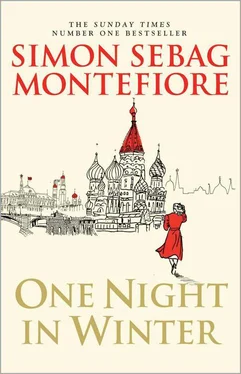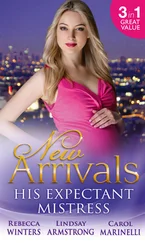‘I have to give the public what they expect.’
‘Well, your dress certainly does that,’ said Dashka.
‘I love your dress too. That cream colour really suits you, and the pleated skirt shows off your curves,’ said Sophia, who also meant it. ‘I have to tart myself up a bit, but you always look so chic and professional. You are our most glamorous minister!’ She hesitated, and then gave her deep throaty laugh. ‘But that’s hardly a compliment when you see the rest of them!’
‘Don’t be ridiculous!’ Dashka laughed away the compliments and started to peruse the table plans. ‘Ah, there I am. Not too bad. I’m on the Council of Ministers’ table.’ She looked at her husband. ‘How about you, Genrikh?’
Genrikh looked pasty and irritable. ‘I’m nowhere near the Politburo,’ he said glumly.
‘No one will notice, dear,’ Dashka said, patting his arm. But Sophia knew that everyone noticed such things and she certainly liked her own placement. Her husband was placed with the editors of the Red Army newspaper, even further away than Genrikh, but she was on the Politburo table.
The leaders hadn’t arrived yet and she could feel everyone looking at her as she put a cigarette in her holder and Marshal Shako lit it.
A hush; then a collective intake of breath: Stalin had entered with the Politburo. The entire Georgievsky Hall jumped to its feet and shouted ‘ Urrah! Urrah! ’ and cheered for so long that Stalin himself first waved at them to sit down, then clapped back at them and finally became cross, ordering them to stop. But no one would stop. Stalin sat down at the table next to Sophia’s between Marshal Shako and Molotov, and, shrugging modestly, looked a little embarrassed until the cheering subsided.
Sophia could not take her eyes off Stalin. As an actress she noticed how he seemed to change before her eyes, walking sometimes with quick little movements, occasionally like a clumsy goose, often more like a stealthy panther.
She was sitting between Satinov and Mikoyan, the most courteous and elegant of the leaders, who were, as a rule, uncouth and dreary. When she looked around, she saw most of them sported the telltale archipelago of red spots on their cheeks, the signs of alcoholism and arteriosclerosis. She noticed the gruesome Beria making eyes at her across the table.
‘I wish he would look at someone else,’ she whispered to Satinov.
‘You are dressed to be admired,’ replied Satinov, who seemed to Sophia to be uncharacteristically tense. ‘Wasn’t Serafima meeting with her Pushkin club friends tonight on the Stone Bridge?’
‘I think so, but I never know where she goes these days,’ Sophia said with a sigh.
‘We know less about our children than we think,’ Satinov agreed. ‘It worries me.’
‘And they know even less about us! Thank God!’ And Sophia laughed huskily.
Twenty stodgy courses – blinis and caviar, borscht with cream, beef Stroganoff, sturgeon, suckling pig, Georgian wines and Crimean champagne, brandy and vodka – were served by the waiters Sophia recognized from the Aragvi as well as the Metropole and National Hotels.
Stalin stood. Silence fell. He spoke in his Georgian tenor, surprisingly high and soft, toasting the Russian people ‘without whom none of us marshals and commanders would be worth a damn!’ Then he turned to the generals, starting with Marshal Zhukov, whom he invited to come and clink glasses with him. Sophia noticed that Stalin downed his glass of vodka at each toast, and guessed that his carafe was full of water.
When he toasted Admiral Isakov, Satinov whispered to Sophia: ‘How’s Isakov going to walk all that way?’ – Isakov had lost his leg in the war – but Stalin seemed to know where the admiral was sitting for he threaded through the tables to the far end of the hall and clinked glasses with him there.
‘That’s so touching!’ Sophia said.
Ten, twenty, forty toasts were drunk, and she lost count until suddenly, surprisingly, it was her turn.
‘Sophia Zeitlin!’ The breath left her body and she felt quite alone in the magnificent hall. ‘Your beauty inspired our soldiers in dark times!’
Somehow she walked over to him, fifteen feet that seemed like a mile. Stalin kissed her hand: ‘Katyusha!’ he toasted. ‘An example to all Soviet womankind.’ How he had aged during the war, she thought as he stood before her. A paunchy old man, grey, grizzled, his skin yellow with pinpricks of red in his cheeks. But what a fine, noble head, what eyes.
When the toasts were over, Stalin and the Politburo filed out but Sophia realized she would never be able to sleep after so much wine, vodka and excitement. She couldn’t go home. She wanted to go on for a nightcap. Marshal Shako winked at her. And then she remembered Satinov’s tension, his question about Serafima, and, as a woman who listened to her instincts, she called for her driver and told him to hurry home.
Serafima was still in her blue dress with the white Peter Pan collar when Sophia and Constantin came in.
‘Mama!’
‘Aren’t you going to ask who toasted your mother tonight?’ Sophia started, but then she saw her daughter’s face. ‘What is it?’
‘Sit down and tell us,’ suggested Constantin, joining Serafima on the sofa and taking her hand. Sophia had to admit he was good at moments like this.
Sophia poured herself a cognac and lit a cigarette: ‘Come on, darling,’ she said, ‘You know nothing shocks me! I’m an actress, for God’s sake.’
‘Let her speak, Sophia,’ Constantin told her.
Then out it came – the Game, the bridge, the gunshots and the two dead children.
‘Oh my God,’ said Sophia, shocked yet relieved that Serafima was safe. ‘I always thought Nikolasha Blagov was a maniac. But dear Rosa, and her poor parents. What on earth were they doing?’
‘The Organs are investigating,’ Serafima said, wiping her eyes. ‘I just can’t believe that Rosa—’
‘Don’t worry, darling,’ said Sophia, looking at her husband to see if he was as worried as she was. She leaned over and put both her hands on Serafima’s face as if to keep her safe, and then straightened up and started to pace the floor. ‘I’m so sad about sweet Rosa but… Stalin kissed my hand tonight. You will be safe. No one would dare touch Sophia Zeitlin’s daughter!’
‘I wish that were true,’ said Constantin, kissing both Serafima’s hands. ‘How I wish that were true.’
Satinov didn’t get home until 4 a.m. the next morning. Stalin had invited him back to the Nearby Dacha after the dinner. The drinking had seemed interminable. All the time he’d been worrying about the children and Tamara.
She was waiting for him as he opened the front door.
‘You know what happened, don’t you?’ she asked.
He nodded.
‘Those poor children,’ she said. ‘And oh, their mothers! I can’t bear to think what they must be going through.’
‘Tell me what you know,’ he said, and listened carefully. ‘Tamriko, I fear our boys have been foolish.’
Tamara sank wearily on to the divan. ‘I noticed the clique at school; we all did. And I warned George not to get mixed up with it. But, oh Hercules, they’re just children.’
‘It will probably be fine,’ he said, looking down at her in his serious way.
Tamriko – he always used the Georgian diminutive – was blonde with green-brown eyes and the most perfectly delicate bone structure. When he held her body in his arms, she felt vulnerable and soft as a little bird. Bolshevik wives were expected to work and he admired her career as a teacher at School 801. When he had wanted to bring his four grown-up sons by his late first wife up from Georgia, she had agreed, treating them as if they were her own. He couldn’t do without her, and the cosy household she’d created in her own image.
Читать дальше












